Corporations Law: Duties of a Director and Recent Statistics
VerifiedAdded on 2022/12/27
|11
|3595
|68
AI Summary
This article discusses the duties of a director under Corporations Law and recent statistics on insolvent trading. It also explores the liability of directors in a specific case.
Contribute Materials
Your contribution can guide someone’s learning journey. Share your
documents today.
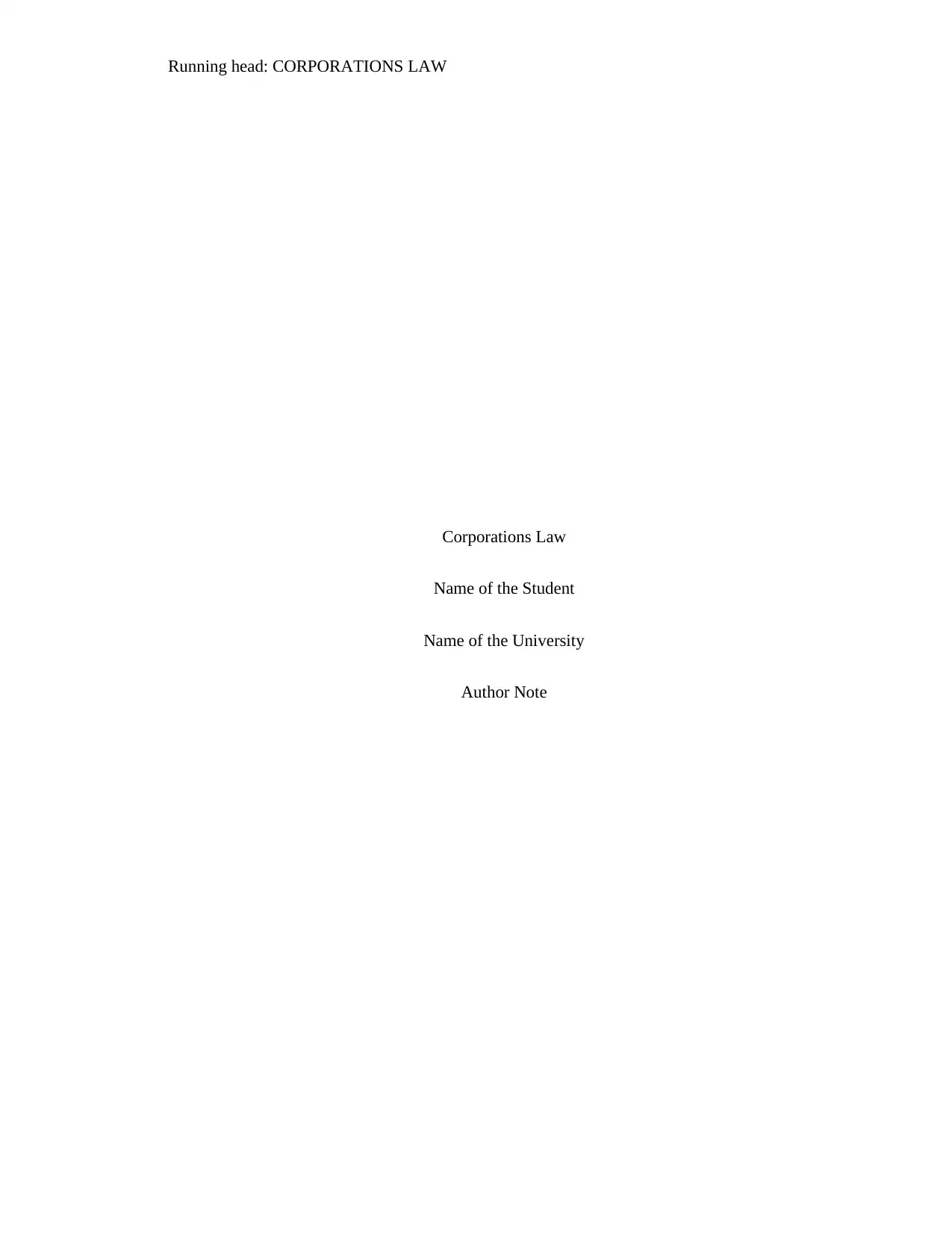
Running head: CORPORATIONS LAW
Corporations Law
Name of the Student
Name of the University
Author Note
Corporations Law
Name of the Student
Name of the University
Author Note
Secure Best Marks with AI Grader
Need help grading? Try our AI Grader for instant feedback on your assignments.
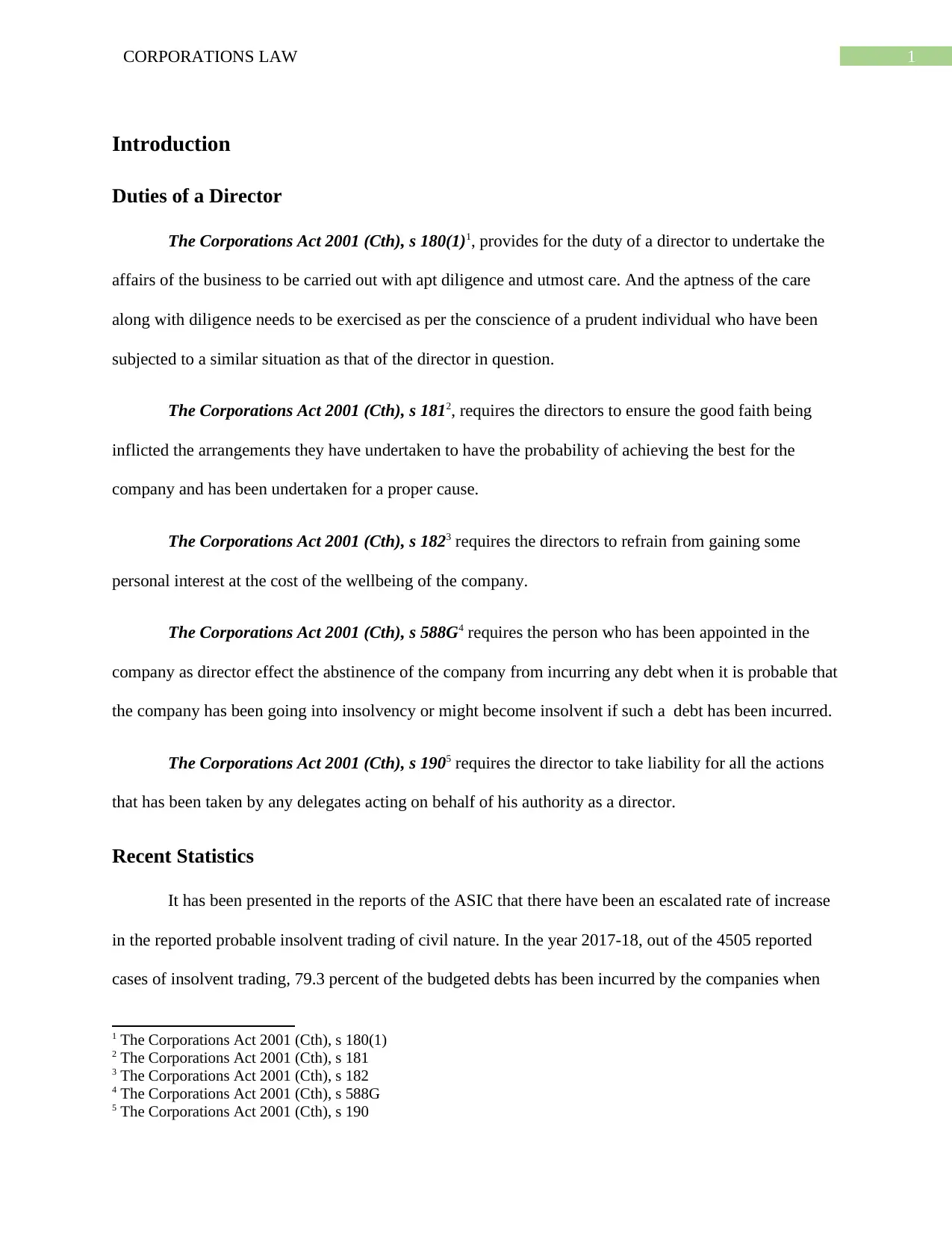
1CORPORATIONS LAW
Introduction
Duties of a Director
The Corporations Act 2001 (Cth), s 180(1)1, provides for the duty of a director to undertake the
affairs of the business to be carried out with apt diligence and utmost care. And the aptness of the care
along with diligence needs to be exercised as per the conscience of a prudent individual who have been
subjected to a similar situation as that of the director in question.
The Corporations Act 2001 (Cth), s 1812, requires the directors to ensure the good faith being
inflicted the arrangements they have undertaken to have the probability of achieving the best for the
company and has been undertaken for a proper cause.
The Corporations Act 2001 (Cth), s 1823 requires the directors to refrain from gaining some
personal interest at the cost of the wellbeing of the company.
The Corporations Act 2001 (Cth), s 588G4 requires the person who has been appointed in the
company as director effect the abstinence of the company from incurring any debt when it is probable that
the company has been going into insolvency or might become insolvent if such a debt has been incurred.
The Corporations Act 2001 (Cth), s 1905 requires the director to take liability for all the actions
that has been taken by any delegates acting on behalf of his authority as a director.
Recent Statistics
It has been presented in the reports of the ASIC that there have been an escalated rate of increase
in the reported probable insolvent trading of civil nature. In the year 2017-18, out of the 4505 reported
cases of insolvent trading, 79.3 percent of the budgeted debts has been incurred by the companies when
1 The Corporations Act 2001 (Cth), s 180(1)
2 The Corporations Act 2001 (Cth), s 181
3 The Corporations Act 2001 (Cth), s 182
4 The Corporations Act 2001 (Cth), s 588G
5 The Corporations Act 2001 (Cth), s 190
Introduction
Duties of a Director
The Corporations Act 2001 (Cth), s 180(1)1, provides for the duty of a director to undertake the
affairs of the business to be carried out with apt diligence and utmost care. And the aptness of the care
along with diligence needs to be exercised as per the conscience of a prudent individual who have been
subjected to a similar situation as that of the director in question.
The Corporations Act 2001 (Cth), s 1812, requires the directors to ensure the good faith being
inflicted the arrangements they have undertaken to have the probability of achieving the best for the
company and has been undertaken for a proper cause.
The Corporations Act 2001 (Cth), s 1823 requires the directors to refrain from gaining some
personal interest at the cost of the wellbeing of the company.
The Corporations Act 2001 (Cth), s 588G4 requires the person who has been appointed in the
company as director effect the abstinence of the company from incurring any debt when it is probable that
the company has been going into insolvency or might become insolvent if such a debt has been incurred.
The Corporations Act 2001 (Cth), s 1905 requires the director to take liability for all the actions
that has been taken by any delegates acting on behalf of his authority as a director.
Recent Statistics
It has been presented in the reports of the ASIC that there have been an escalated rate of increase
in the reported probable insolvent trading of civil nature. In the year 2017-18, out of the 4505 reported
cases of insolvent trading, 79.3 percent of the budgeted debts has been incurred by the companies when
1 The Corporations Act 2001 (Cth), s 180(1)
2 The Corporations Act 2001 (Cth), s 181
3 The Corporations Act 2001 (Cth), s 182
4 The Corporations Act 2001 (Cth), s 588G
5 The Corporations Act 2001 (Cth), s 190
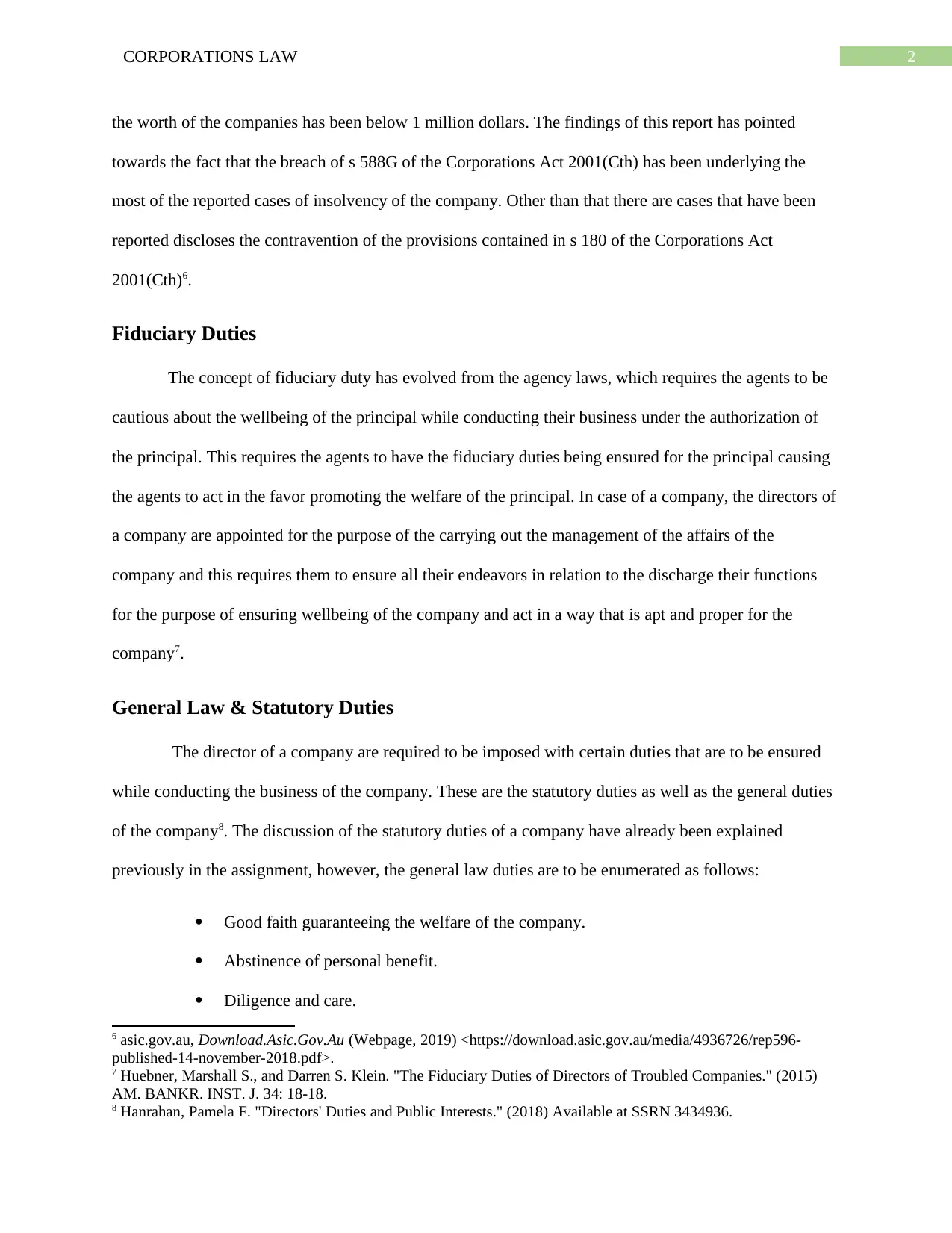
2CORPORATIONS LAW
the worth of the companies has been below 1 million dollars. The findings of this report has pointed
towards the fact that the breach of s 588G of the Corporations Act 2001(Cth) has been underlying the
most of the reported cases of insolvency of the company. Other than that there are cases that have been
reported discloses the contravention of the provisions contained in s 180 of the Corporations Act
2001(Cth)6.
Fiduciary Duties
The concept of fiduciary duty has evolved from the agency laws, which requires the agents to be
cautious about the wellbeing of the principal while conducting their business under the authorization of
the principal. This requires the agents to have the fiduciary duties being ensured for the principal causing
the agents to act in the favor promoting the welfare of the principal. In case of a company, the directors of
a company are appointed for the purpose of the carrying out the management of the affairs of the
company and this requires them to ensure all their endeavors in relation to the discharge their functions
for the purpose of ensuring wellbeing of the company and act in a way that is apt and proper for the
company7.
General Law & Statutory Duties
The director of a company are required to be imposed with certain duties that are to be ensured
while conducting the business of the company. These are the statutory duties as well as the general duties
of the company8. The discussion of the statutory duties of a company have already been explained
previously in the assignment, however, the general law duties are to be enumerated as follows:
Good faith guaranteeing the welfare of the company.
Abstinence of personal benefit.
Diligence and care.
6 asic.gov.au, Download.Asic.Gov.Au (Webpage, 2019) <https://download.asic.gov.au/media/4936726/rep596-
published-14-november-2018.pdf>.
7 Huebner, Marshall S., and Darren S. Klein. "The Fiduciary Duties of Directors of Troubled Companies." (2015)
AM. BANKR. INST. J. 34: 18-18.
8 Hanrahan, Pamela F. "Directors' Duties and Public Interests." (2018) Available at SSRN 3434936.
the worth of the companies has been below 1 million dollars. The findings of this report has pointed
towards the fact that the breach of s 588G of the Corporations Act 2001(Cth) has been underlying the
most of the reported cases of insolvency of the company. Other than that there are cases that have been
reported discloses the contravention of the provisions contained in s 180 of the Corporations Act
2001(Cth)6.
Fiduciary Duties
The concept of fiduciary duty has evolved from the agency laws, which requires the agents to be
cautious about the wellbeing of the principal while conducting their business under the authorization of
the principal. This requires the agents to have the fiduciary duties being ensured for the principal causing
the agents to act in the favor promoting the welfare of the principal. In case of a company, the directors of
a company are appointed for the purpose of the carrying out the management of the affairs of the
company and this requires them to ensure all their endeavors in relation to the discharge their functions
for the purpose of ensuring wellbeing of the company and act in a way that is apt and proper for the
company7.
General Law & Statutory Duties
The director of a company are required to be imposed with certain duties that are to be ensured
while conducting the business of the company. These are the statutory duties as well as the general duties
of the company8. The discussion of the statutory duties of a company have already been explained
previously in the assignment, however, the general law duties are to be enumerated as follows:
Good faith guaranteeing the welfare of the company.
Abstinence of personal benefit.
Diligence and care.
6 asic.gov.au, Download.Asic.Gov.Au (Webpage, 2019) <https://download.asic.gov.au/media/4936726/rep596-
published-14-november-2018.pdf>.
7 Huebner, Marshall S., and Darren S. Klein. "The Fiduciary Duties of Directors of Troubled Companies." (2015)
AM. BANKR. INST. J. 34: 18-18.
8 Hanrahan, Pamela F. "Directors' Duties and Public Interests." (2018) Available at SSRN 3434936.
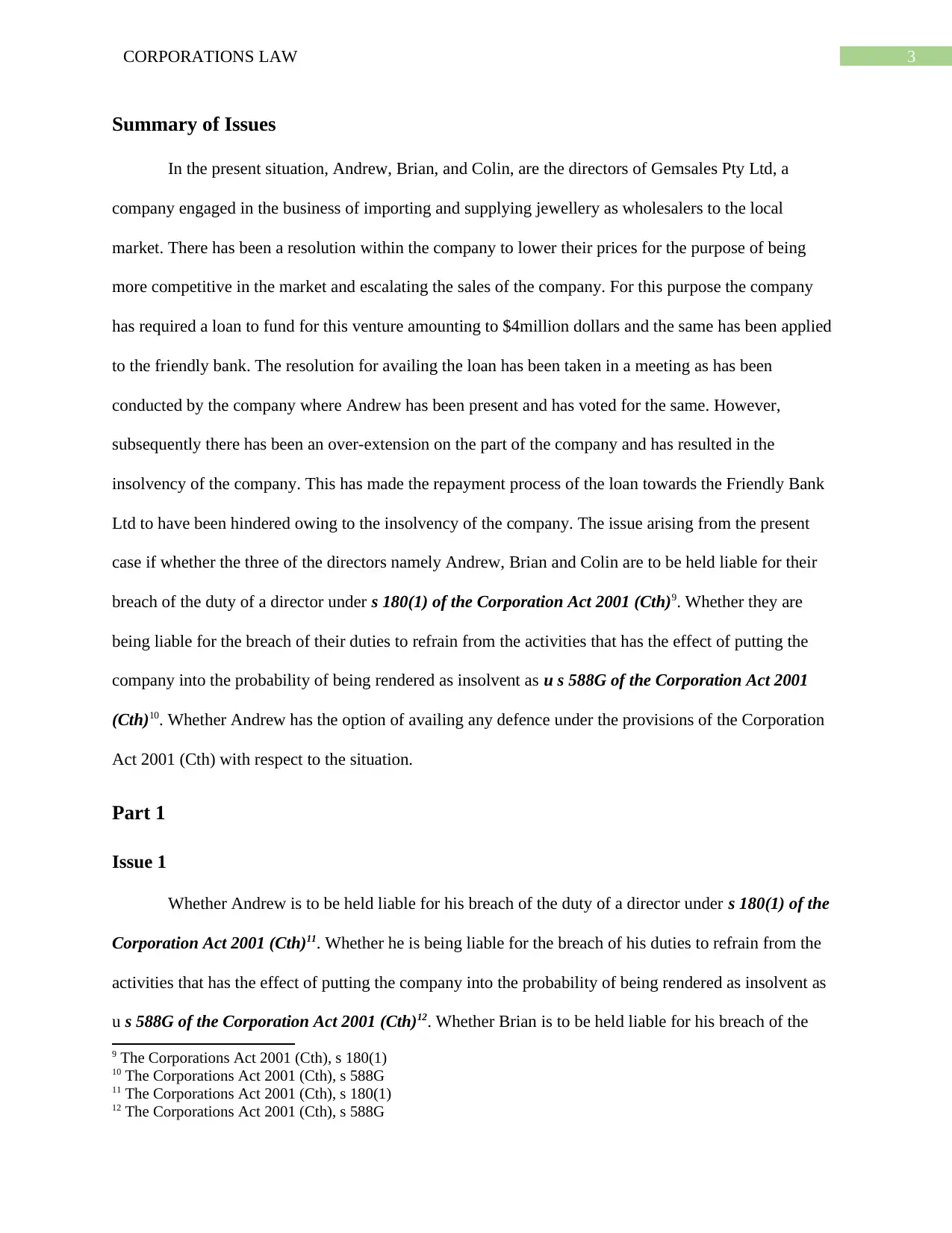
3CORPORATIONS LAW
Summary of Issues
In the present situation, Andrew, Brian, and Colin, are the directors of Gemsales Pty Ltd, a
company engaged in the business of importing and supplying jewellery as wholesalers to the local
market. There has been a resolution within the company to lower their prices for the purpose of being
more competitive in the market and escalating the sales of the company. For this purpose the company
has required a loan to fund for this venture amounting to $4million dollars and the same has been applied
to the friendly bank. The resolution for availing the loan has been taken in a meeting as has been
conducted by the company where Andrew has been present and has voted for the same. However,
subsequently there has been an over-extension on the part of the company and has resulted in the
insolvency of the company. This has made the repayment process of the loan towards the Friendly Bank
Ltd to have been hindered owing to the insolvency of the company. The issue arising from the present
case if whether the three of the directors namely Andrew, Brian and Colin are to be held liable for their
breach of the duty of a director under s 180(1) of the Corporation Act 2001 (Cth)9. Whether they are
being liable for the breach of their duties to refrain from the activities that has the effect of putting the
company into the probability of being rendered as insolvent as u s 588G of the Corporation Act 2001
(Cth)10. Whether Andrew has the option of availing any defence under the provisions of the Corporation
Act 2001 (Cth) with respect to the situation.
Part 1
Issue 1
Whether Andrew is to be held liable for his breach of the duty of a director under s 180(1) of the
Corporation Act 2001 (Cth)11. Whether he is being liable for the breach of his duties to refrain from the
activities that has the effect of putting the company into the probability of being rendered as insolvent as
u s 588G of the Corporation Act 2001 (Cth)12. Whether Brian is to be held liable for his breach of the
9 The Corporations Act 2001 (Cth), s 180(1)
10 The Corporations Act 2001 (Cth), s 588G
11 The Corporations Act 2001 (Cth), s 180(1)
12 The Corporations Act 2001 (Cth), s 588G
Summary of Issues
In the present situation, Andrew, Brian, and Colin, are the directors of Gemsales Pty Ltd, a
company engaged in the business of importing and supplying jewellery as wholesalers to the local
market. There has been a resolution within the company to lower their prices for the purpose of being
more competitive in the market and escalating the sales of the company. For this purpose the company
has required a loan to fund for this venture amounting to $4million dollars and the same has been applied
to the friendly bank. The resolution for availing the loan has been taken in a meeting as has been
conducted by the company where Andrew has been present and has voted for the same. However,
subsequently there has been an over-extension on the part of the company and has resulted in the
insolvency of the company. This has made the repayment process of the loan towards the Friendly Bank
Ltd to have been hindered owing to the insolvency of the company. The issue arising from the present
case if whether the three of the directors namely Andrew, Brian and Colin are to be held liable for their
breach of the duty of a director under s 180(1) of the Corporation Act 2001 (Cth)9. Whether they are
being liable for the breach of their duties to refrain from the activities that has the effect of putting the
company into the probability of being rendered as insolvent as u s 588G of the Corporation Act 2001
(Cth)10. Whether Andrew has the option of availing any defence under the provisions of the Corporation
Act 2001 (Cth) with respect to the situation.
Part 1
Issue 1
Whether Andrew is to be held liable for his breach of the duty of a director under s 180(1) of the
Corporation Act 2001 (Cth)11. Whether he is being liable for the breach of his duties to refrain from the
activities that has the effect of putting the company into the probability of being rendered as insolvent as
u s 588G of the Corporation Act 2001 (Cth)12. Whether Brian is to be held liable for his breach of the
9 The Corporations Act 2001 (Cth), s 180(1)
10 The Corporations Act 2001 (Cth), s 588G
11 The Corporations Act 2001 (Cth), s 180(1)
12 The Corporations Act 2001 (Cth), s 588G
Secure Best Marks with AI Grader
Need help grading? Try our AI Grader for instant feedback on your assignments.
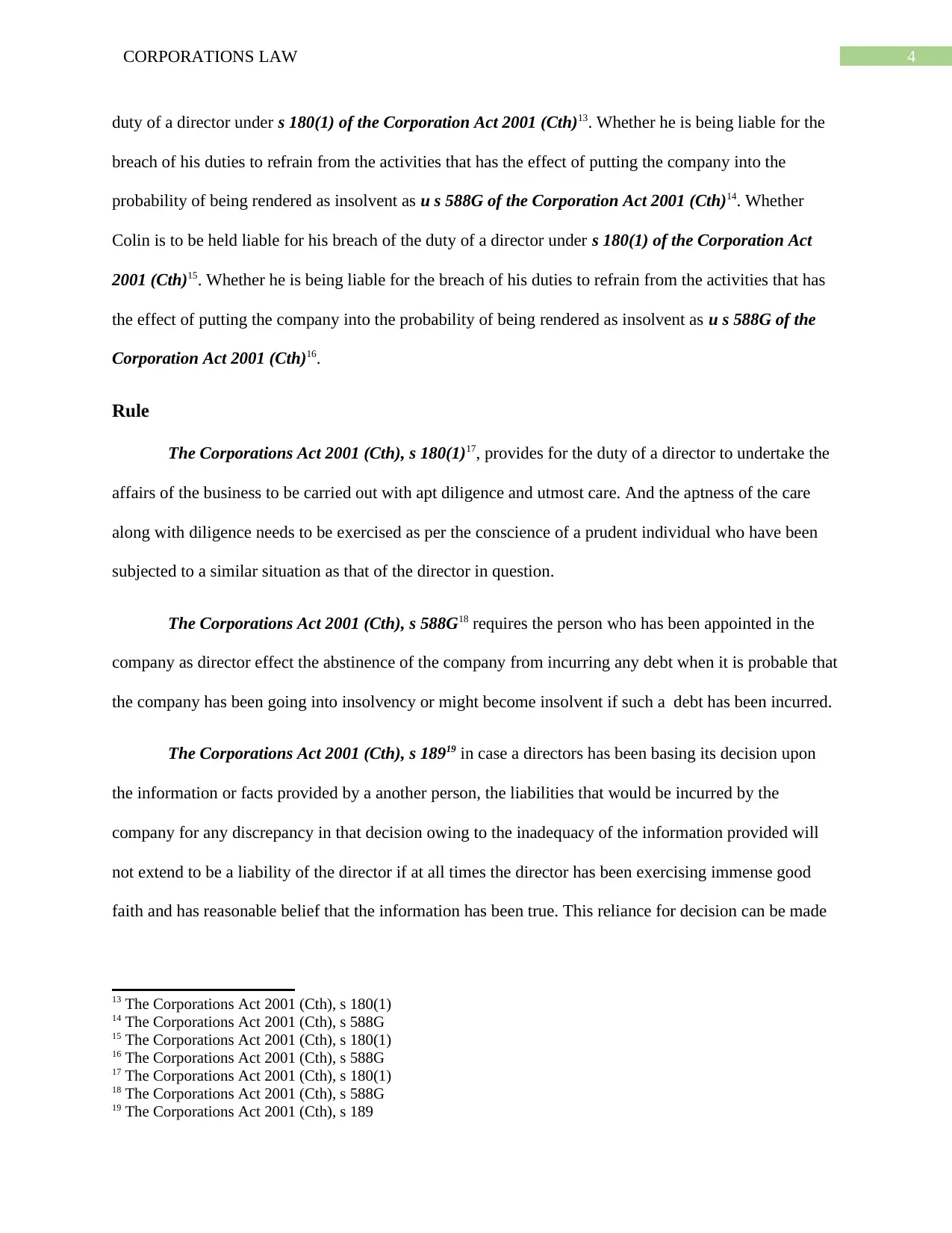
4CORPORATIONS LAW
duty of a director under s 180(1) of the Corporation Act 2001 (Cth)13. Whether he is being liable for the
breach of his duties to refrain from the activities that has the effect of putting the company into the
probability of being rendered as insolvent as u s 588G of the Corporation Act 2001 (Cth)14. Whether
Colin is to be held liable for his breach of the duty of a director under s 180(1) of the Corporation Act
2001 (Cth)15. Whether he is being liable for the breach of his duties to refrain from the activities that has
the effect of putting the company into the probability of being rendered as insolvent as u s 588G of the
Corporation Act 2001 (Cth)16.
Rule
The Corporations Act 2001 (Cth), s 180(1)17, provides for the duty of a director to undertake the
affairs of the business to be carried out with apt diligence and utmost care. And the aptness of the care
along with diligence needs to be exercised as per the conscience of a prudent individual who have been
subjected to a similar situation as that of the director in question.
The Corporations Act 2001 (Cth), s 588G18 requires the person who has been appointed in the
company as director effect the abstinence of the company from incurring any debt when it is probable that
the company has been going into insolvency or might become insolvent if such a debt has been incurred.
The Corporations Act 2001 (Cth), s 18919 in case a directors has been basing its decision upon
the information or facts provided by a another person, the liabilities that would be incurred by the
company for any discrepancy in that decision owing to the inadequacy of the information provided will
not extend to be a liability of the director if at all times the director has been exercising immense good
faith and has reasonable belief that the information has been true. This reliance for decision can be made
13 The Corporations Act 2001 (Cth), s 180(1)
14 The Corporations Act 2001 (Cth), s 588G
15 The Corporations Act 2001 (Cth), s 180(1)
16 The Corporations Act 2001 (Cth), s 588G
17 The Corporations Act 2001 (Cth), s 180(1)
18 The Corporations Act 2001 (Cth), s 588G
19 The Corporations Act 2001 (Cth), s 189
duty of a director under s 180(1) of the Corporation Act 2001 (Cth)13. Whether he is being liable for the
breach of his duties to refrain from the activities that has the effect of putting the company into the
probability of being rendered as insolvent as u s 588G of the Corporation Act 2001 (Cth)14. Whether
Colin is to be held liable for his breach of the duty of a director under s 180(1) of the Corporation Act
2001 (Cth)15. Whether he is being liable for the breach of his duties to refrain from the activities that has
the effect of putting the company into the probability of being rendered as insolvent as u s 588G of the
Corporation Act 2001 (Cth)16.
Rule
The Corporations Act 2001 (Cth), s 180(1)17, provides for the duty of a director to undertake the
affairs of the business to be carried out with apt diligence and utmost care. And the aptness of the care
along with diligence needs to be exercised as per the conscience of a prudent individual who have been
subjected to a similar situation as that of the director in question.
The Corporations Act 2001 (Cth), s 588G18 requires the person who has been appointed in the
company as director effect the abstinence of the company from incurring any debt when it is probable that
the company has been going into insolvency or might become insolvent if such a debt has been incurred.
The Corporations Act 2001 (Cth), s 18919 in case a directors has been basing its decision upon
the information or facts provided by a another person, the liabilities that would be incurred by the
company for any discrepancy in that decision owing to the inadequacy of the information provided will
not extend to be a liability of the director if at all times the director has been exercising immense good
faith and has reasonable belief that the information has been true. This reliance for decision can be made
13 The Corporations Act 2001 (Cth), s 180(1)
14 The Corporations Act 2001 (Cth), s 588G
15 The Corporations Act 2001 (Cth), s 180(1)
16 The Corporations Act 2001 (Cth), s 588G
17 The Corporations Act 2001 (Cth), s 180(1)
18 The Corporations Act 2001 (Cth), s 588G
19 The Corporations Act 2001 (Cth), s 189
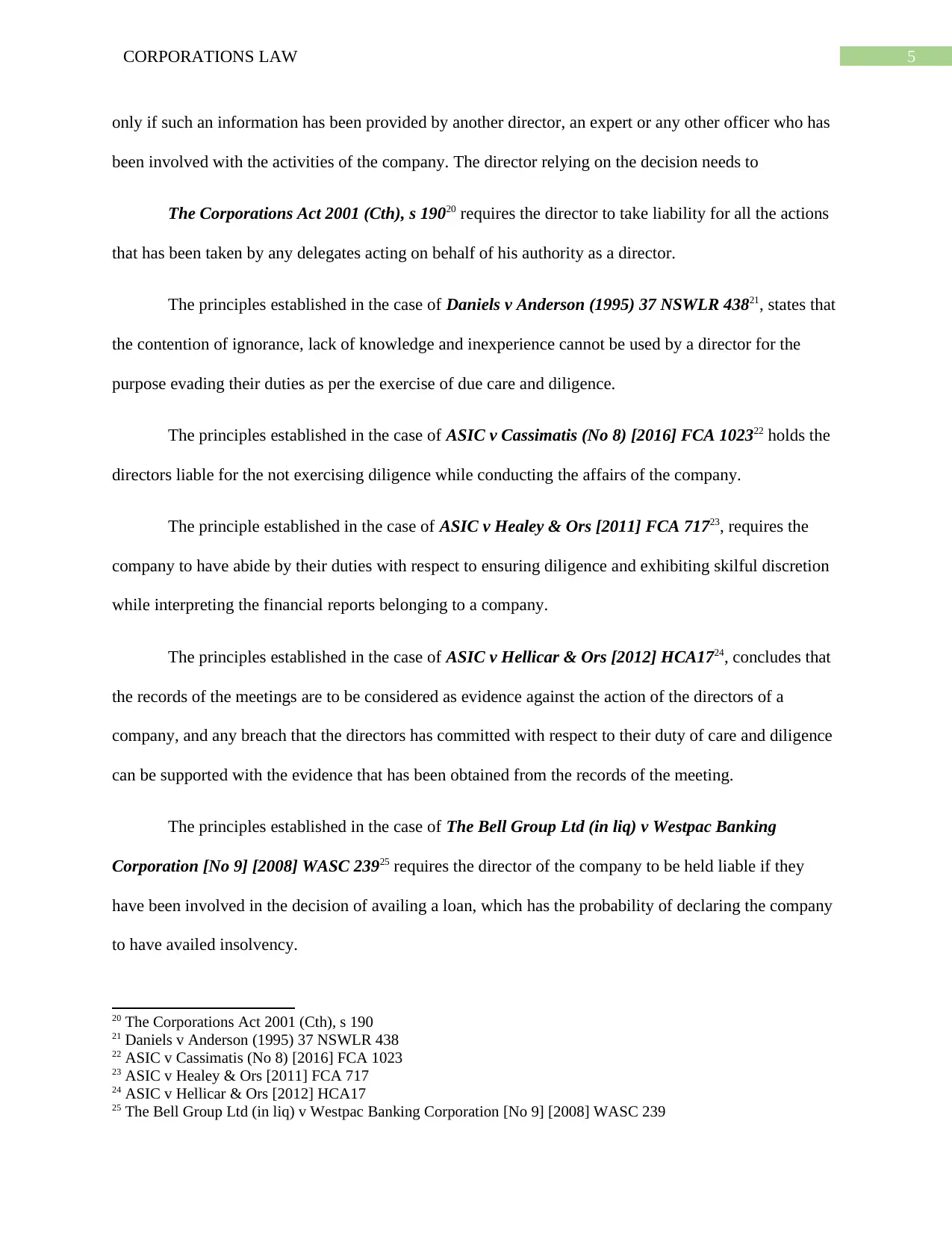
5CORPORATIONS LAW
only if such an information has been provided by another director, an expert or any other officer who has
been involved with the activities of the company. The director relying on the decision needs to
The Corporations Act 2001 (Cth), s 19020 requires the director to take liability for all the actions
that has been taken by any delegates acting on behalf of his authority as a director.
The principles established in the case of Daniels v Anderson (1995) 37 NSWLR 43821, states that
the contention of ignorance, lack of knowledge and inexperience cannot be used by a director for the
purpose evading their duties as per the exercise of due care and diligence.
The principles established in the case of ASIC v Cassimatis (No 8) [2016] FCA 102322 holds the
directors liable for the not exercising diligence while conducting the affairs of the company.
The principle established in the case of ASIC v Healey & Ors [2011] FCA 71723, requires the
company to have abide by their duties with respect to ensuring diligence and exhibiting skilful discretion
while interpreting the financial reports belonging to a company.
The principles established in the case of ASIC v Hellicar & Ors [2012] HCA1724, concludes that
the records of the meetings are to be considered as evidence against the action of the directors of a
company, and any breach that the directors has committed with respect to their duty of care and diligence
can be supported with the evidence that has been obtained from the records of the meeting.
The principles established in the case of The Bell Group Ltd (in liq) v Westpac Banking
Corporation [No 9] [2008] WASC 23925 requires the director of the company to be held liable if they
have been involved in the decision of availing a loan, which has the probability of declaring the company
to have availed insolvency.
20 The Corporations Act 2001 (Cth), s 190
21 Daniels v Anderson (1995) 37 NSWLR 438
22 ASIC v Cassimatis (No 8) [2016] FCA 1023
23 ASIC v Healey & Ors [2011] FCA 717
24 ASIC v Hellicar & Ors [2012] HCA17
25 The Bell Group Ltd (in liq) v Westpac Banking Corporation [No 9] [2008] WASC 239
only if such an information has been provided by another director, an expert or any other officer who has
been involved with the activities of the company. The director relying on the decision needs to
The Corporations Act 2001 (Cth), s 19020 requires the director to take liability for all the actions
that has been taken by any delegates acting on behalf of his authority as a director.
The principles established in the case of Daniels v Anderson (1995) 37 NSWLR 43821, states that
the contention of ignorance, lack of knowledge and inexperience cannot be used by a director for the
purpose evading their duties as per the exercise of due care and diligence.
The principles established in the case of ASIC v Cassimatis (No 8) [2016] FCA 102322 holds the
directors liable for the not exercising diligence while conducting the affairs of the company.
The principle established in the case of ASIC v Healey & Ors [2011] FCA 71723, requires the
company to have abide by their duties with respect to ensuring diligence and exhibiting skilful discretion
while interpreting the financial reports belonging to a company.
The principles established in the case of ASIC v Hellicar & Ors [2012] HCA1724, concludes that
the records of the meetings are to be considered as evidence against the action of the directors of a
company, and any breach that the directors has committed with respect to their duty of care and diligence
can be supported with the evidence that has been obtained from the records of the meeting.
The principles established in the case of The Bell Group Ltd (in liq) v Westpac Banking
Corporation [No 9] [2008] WASC 23925 requires the director of the company to be held liable if they
have been involved in the decision of availing a loan, which has the probability of declaring the company
to have availed insolvency.
20 The Corporations Act 2001 (Cth), s 190
21 Daniels v Anderson (1995) 37 NSWLR 438
22 ASIC v Cassimatis (No 8) [2016] FCA 1023
23 ASIC v Healey & Ors [2011] FCA 717
24 ASIC v Hellicar & Ors [2012] HCA17
25 The Bell Group Ltd (in liq) v Westpac Banking Corporation [No 9] [2008] WASC 239
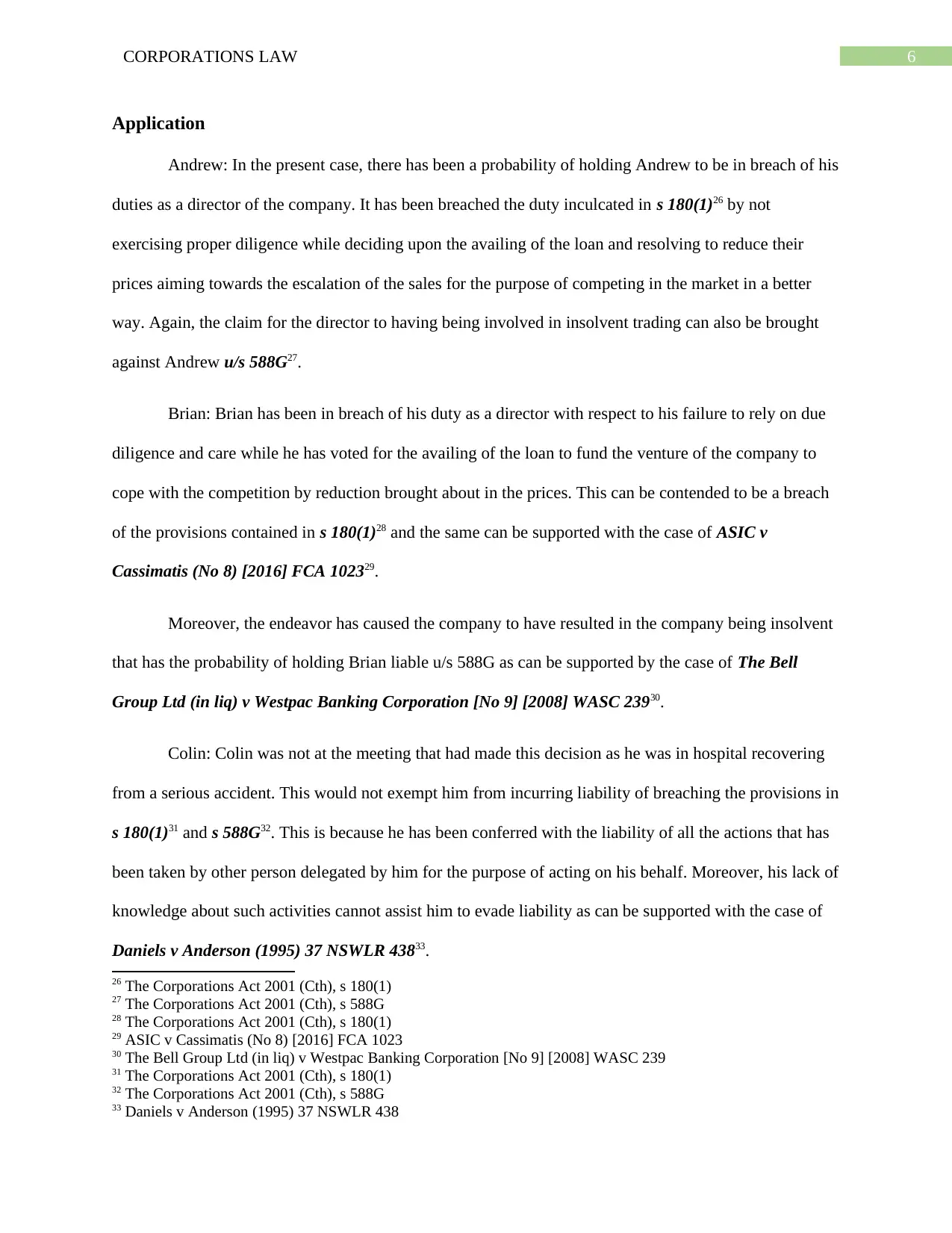
6CORPORATIONS LAW
Application
Andrew: In the present case, there has been a probability of holding Andrew to be in breach of his
duties as a director of the company. It has been breached the duty inculcated in s 180(1)26 by not
exercising proper diligence while deciding upon the availing of the loan and resolving to reduce their
prices aiming towards the escalation of the sales for the purpose of competing in the market in a better
way. Again, the claim for the director to having being involved in insolvent trading can also be brought
against Andrew u/s 588G27.
Brian: Brian has been in breach of his duty as a director with respect to his failure to rely on due
diligence and care while he has voted for the availing of the loan to fund the venture of the company to
cope with the competition by reduction brought about in the prices. This can be contended to be a breach
of the provisions contained in s 180(1)28 and the same can be supported with the case of ASIC v
Cassimatis (No 8) [2016] FCA 102329.
Moreover, the endeavor has caused the company to have resulted in the company being insolvent
that has the probability of holding Brian liable u/s 588G as can be supported by the case of The Bell
Group Ltd (in liq) v Westpac Banking Corporation [No 9] [2008] WASC 23930.
Colin: Colin was not at the meeting that had made this decision as he was in hospital recovering
from a serious accident. This would not exempt him from incurring liability of breaching the provisions in
s 180(1)31 and s 588G32. This is because he has been conferred with the liability of all the actions that has
been taken by other person delegated by him for the purpose of acting on his behalf. Moreover, his lack of
knowledge about such activities cannot assist him to evade liability as can be supported with the case of
Daniels v Anderson (1995) 37 NSWLR 43833.
26 The Corporations Act 2001 (Cth), s 180(1)
27 The Corporations Act 2001 (Cth), s 588G
28 The Corporations Act 2001 (Cth), s 180(1)
29 ASIC v Cassimatis (No 8) [2016] FCA 1023
30 The Bell Group Ltd (in liq) v Westpac Banking Corporation [No 9] [2008] WASC 239
31 The Corporations Act 2001 (Cth), s 180(1)
32 The Corporations Act 2001 (Cth), s 588G
33 Daniels v Anderson (1995) 37 NSWLR 438
Application
Andrew: In the present case, there has been a probability of holding Andrew to be in breach of his
duties as a director of the company. It has been breached the duty inculcated in s 180(1)26 by not
exercising proper diligence while deciding upon the availing of the loan and resolving to reduce their
prices aiming towards the escalation of the sales for the purpose of competing in the market in a better
way. Again, the claim for the director to having being involved in insolvent trading can also be brought
against Andrew u/s 588G27.
Brian: Brian has been in breach of his duty as a director with respect to his failure to rely on due
diligence and care while he has voted for the availing of the loan to fund the venture of the company to
cope with the competition by reduction brought about in the prices. This can be contended to be a breach
of the provisions contained in s 180(1)28 and the same can be supported with the case of ASIC v
Cassimatis (No 8) [2016] FCA 102329.
Moreover, the endeavor has caused the company to have resulted in the company being insolvent
that has the probability of holding Brian liable u/s 588G as can be supported by the case of The Bell
Group Ltd (in liq) v Westpac Banking Corporation [No 9] [2008] WASC 23930.
Colin: Colin was not at the meeting that had made this decision as he was in hospital recovering
from a serious accident. This would not exempt him from incurring liability of breaching the provisions in
s 180(1)31 and s 588G32. This is because he has been conferred with the liability of all the actions that has
been taken by other person delegated by him for the purpose of acting on his behalf. Moreover, his lack of
knowledge about such activities cannot assist him to evade liability as can be supported with the case of
Daniels v Anderson (1995) 37 NSWLR 43833.
26 The Corporations Act 2001 (Cth), s 180(1)
27 The Corporations Act 2001 (Cth), s 588G
28 The Corporations Act 2001 (Cth), s 180(1)
29 ASIC v Cassimatis (No 8) [2016] FCA 1023
30 The Bell Group Ltd (in liq) v Westpac Banking Corporation [No 9] [2008] WASC 239
31 The Corporations Act 2001 (Cth), s 180(1)
32 The Corporations Act 2001 (Cth), s 588G
33 Daniels v Anderson (1995) 37 NSWLR 438
Paraphrase This Document
Need a fresh take? Get an instant paraphrase of this document with our AI Paraphraser
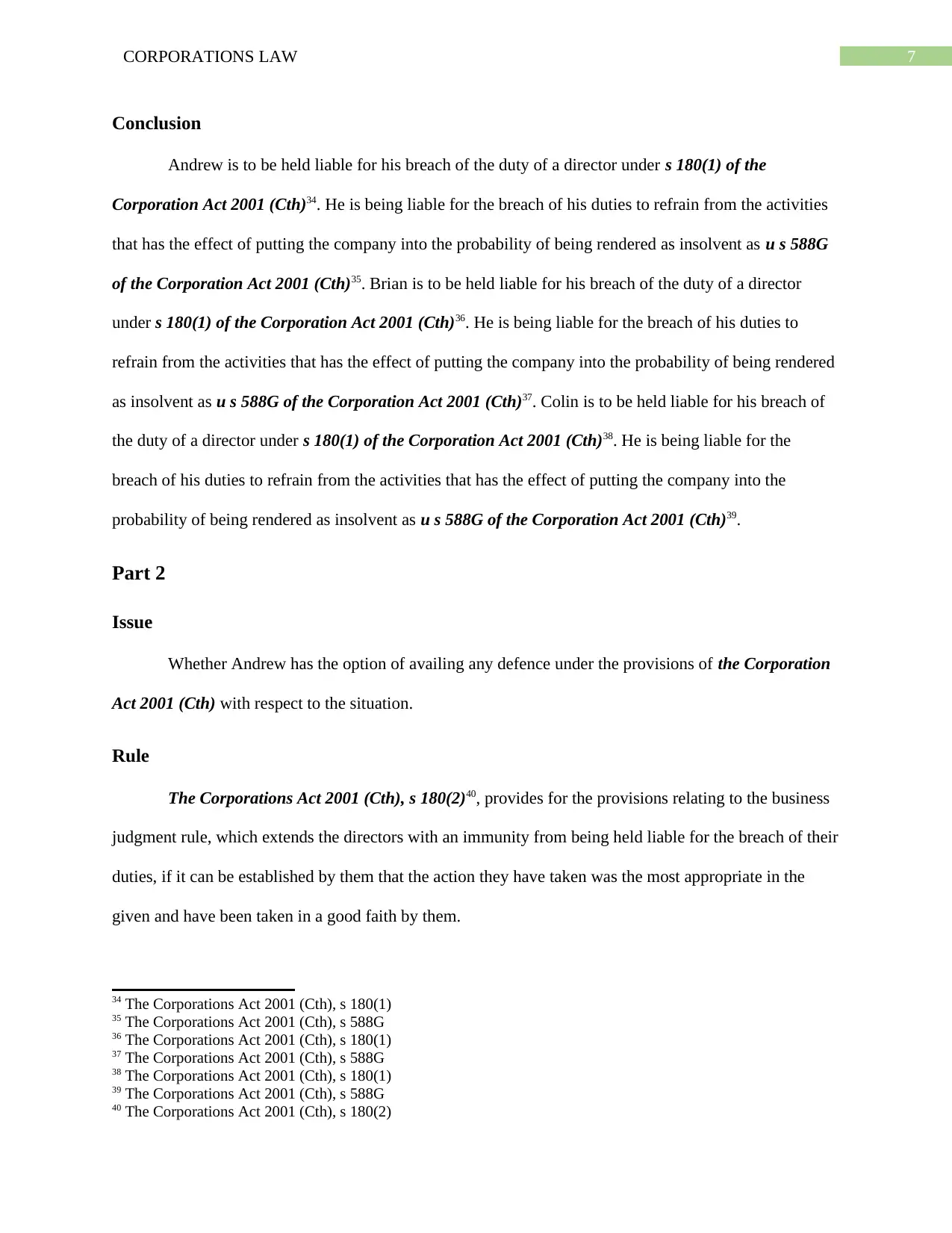
7CORPORATIONS LAW
Conclusion
Andrew is to be held liable for his breach of the duty of a director under s 180(1) of the
Corporation Act 2001 (Cth)34. He is being liable for the breach of his duties to refrain from the activities
that has the effect of putting the company into the probability of being rendered as insolvent as u s 588G
of the Corporation Act 2001 (Cth)35. Brian is to be held liable for his breach of the duty of a director
under s 180(1) of the Corporation Act 2001 (Cth)36. He is being liable for the breach of his duties to
refrain from the activities that has the effect of putting the company into the probability of being rendered
as insolvent as u s 588G of the Corporation Act 2001 (Cth)37. Colin is to be held liable for his breach of
the duty of a director under s 180(1) of the Corporation Act 2001 (Cth)38. He is being liable for the
breach of his duties to refrain from the activities that has the effect of putting the company into the
probability of being rendered as insolvent as u s 588G of the Corporation Act 2001 (Cth)39.
Part 2
Issue
Whether Andrew has the option of availing any defence under the provisions of the Corporation
Act 2001 (Cth) with respect to the situation.
Rule
The Corporations Act 2001 (Cth), s 180(2)40, provides for the provisions relating to the business
judgment rule, which extends the directors with an immunity from being held liable for the breach of their
duties, if it can be established by them that the action they have taken was the most appropriate in the
given and have been taken in a good faith by them.
34 The Corporations Act 2001 (Cth), s 180(1)
35 The Corporations Act 2001 (Cth), s 588G
36 The Corporations Act 2001 (Cth), s 180(1)
37 The Corporations Act 2001 (Cth), s 588G
38 The Corporations Act 2001 (Cth), s 180(1)
39 The Corporations Act 2001 (Cth), s 588G
40 The Corporations Act 2001 (Cth), s 180(2)
Conclusion
Andrew is to be held liable for his breach of the duty of a director under s 180(1) of the
Corporation Act 2001 (Cth)34. He is being liable for the breach of his duties to refrain from the activities
that has the effect of putting the company into the probability of being rendered as insolvent as u s 588G
of the Corporation Act 2001 (Cth)35. Brian is to be held liable for his breach of the duty of a director
under s 180(1) of the Corporation Act 2001 (Cth)36. He is being liable for the breach of his duties to
refrain from the activities that has the effect of putting the company into the probability of being rendered
as insolvent as u s 588G of the Corporation Act 2001 (Cth)37. Colin is to be held liable for his breach of
the duty of a director under s 180(1) of the Corporation Act 2001 (Cth)38. He is being liable for the
breach of his duties to refrain from the activities that has the effect of putting the company into the
probability of being rendered as insolvent as u s 588G of the Corporation Act 2001 (Cth)39.
Part 2
Issue
Whether Andrew has the option of availing any defence under the provisions of the Corporation
Act 2001 (Cth) with respect to the situation.
Rule
The Corporations Act 2001 (Cth), s 180(2)40, provides for the provisions relating to the business
judgment rule, which extends the directors with an immunity from being held liable for the breach of their
duties, if it can be established by them that the action they have taken was the most appropriate in the
given and have been taken in a good faith by them.
34 The Corporations Act 2001 (Cth), s 180(1)
35 The Corporations Act 2001 (Cth), s 588G
36 The Corporations Act 2001 (Cth), s 180(1)
37 The Corporations Act 2001 (Cth), s 588G
38 The Corporations Act 2001 (Cth), s 180(1)
39 The Corporations Act 2001 (Cth), s 588G
40 The Corporations Act 2001 (Cth), s 180(2)
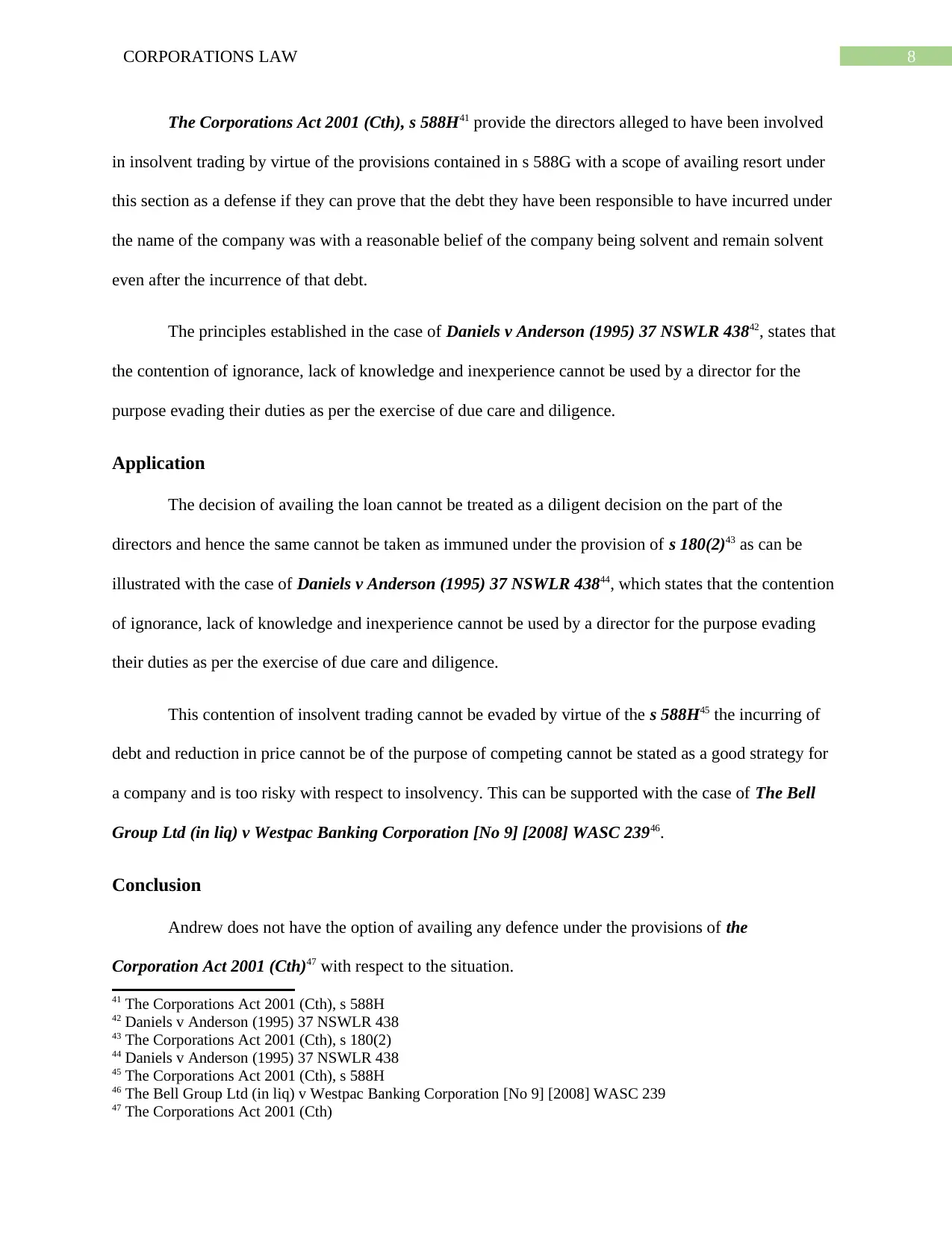
8CORPORATIONS LAW
The Corporations Act 2001 (Cth), s 588H41 provide the directors alleged to have been involved
in insolvent trading by virtue of the provisions contained in s 588G with a scope of availing resort under
this section as a defense if they can prove that the debt they have been responsible to have incurred under
the name of the company was with a reasonable belief of the company being solvent and remain solvent
even after the incurrence of that debt.
The principles established in the case of Daniels v Anderson (1995) 37 NSWLR 43842, states that
the contention of ignorance, lack of knowledge and inexperience cannot be used by a director for the
purpose evading their duties as per the exercise of due care and diligence.
Application
The decision of availing the loan cannot be treated as a diligent decision on the part of the
directors and hence the same cannot be taken as immuned under the provision of s 180(2)43 as can be
illustrated with the case of Daniels v Anderson (1995) 37 NSWLR 43844, which states that the contention
of ignorance, lack of knowledge and inexperience cannot be used by a director for the purpose evading
their duties as per the exercise of due care and diligence.
This contention of insolvent trading cannot be evaded by virtue of the s 588H45 the incurring of
debt and reduction in price cannot be of the purpose of competing cannot be stated as a good strategy for
a company and is too risky with respect to insolvency. This can be supported with the case of The Bell
Group Ltd (in liq) v Westpac Banking Corporation [No 9] [2008] WASC 23946.
Conclusion
Andrew does not have the option of availing any defence under the provisions of the
Corporation Act 2001 (Cth)47 with respect to the situation.
41 The Corporations Act 2001 (Cth), s 588H
42 Daniels v Anderson (1995) 37 NSWLR 438
43 The Corporations Act 2001 (Cth), s 180(2)
44 Daniels v Anderson (1995) 37 NSWLR 438
45 The Corporations Act 2001 (Cth), s 588H
46 The Bell Group Ltd (in liq) v Westpac Banking Corporation [No 9] [2008] WASC 239
47 The Corporations Act 2001 (Cth)
The Corporations Act 2001 (Cth), s 588H41 provide the directors alleged to have been involved
in insolvent trading by virtue of the provisions contained in s 588G with a scope of availing resort under
this section as a defense if they can prove that the debt they have been responsible to have incurred under
the name of the company was with a reasonable belief of the company being solvent and remain solvent
even after the incurrence of that debt.
The principles established in the case of Daniels v Anderson (1995) 37 NSWLR 43842, states that
the contention of ignorance, lack of knowledge and inexperience cannot be used by a director for the
purpose evading their duties as per the exercise of due care and diligence.
Application
The decision of availing the loan cannot be treated as a diligent decision on the part of the
directors and hence the same cannot be taken as immuned under the provision of s 180(2)43 as can be
illustrated with the case of Daniels v Anderson (1995) 37 NSWLR 43844, which states that the contention
of ignorance, lack of knowledge and inexperience cannot be used by a director for the purpose evading
their duties as per the exercise of due care and diligence.
This contention of insolvent trading cannot be evaded by virtue of the s 588H45 the incurring of
debt and reduction in price cannot be of the purpose of competing cannot be stated as a good strategy for
a company and is too risky with respect to insolvency. This can be supported with the case of The Bell
Group Ltd (in liq) v Westpac Banking Corporation [No 9] [2008] WASC 23946.
Conclusion
Andrew does not have the option of availing any defence under the provisions of the
Corporation Act 2001 (Cth)47 with respect to the situation.
41 The Corporations Act 2001 (Cth), s 588H
42 Daniels v Anderson (1995) 37 NSWLR 438
43 The Corporations Act 2001 (Cth), s 180(2)
44 Daniels v Anderson (1995) 37 NSWLR 438
45 The Corporations Act 2001 (Cth), s 588H
46 The Bell Group Ltd (in liq) v Westpac Banking Corporation [No 9] [2008] WASC 239
47 The Corporations Act 2001 (Cth)

9CORPORATIONS LAW
Secure Best Marks with AI Grader
Need help grading? Try our AI Grader for instant feedback on your assignments.
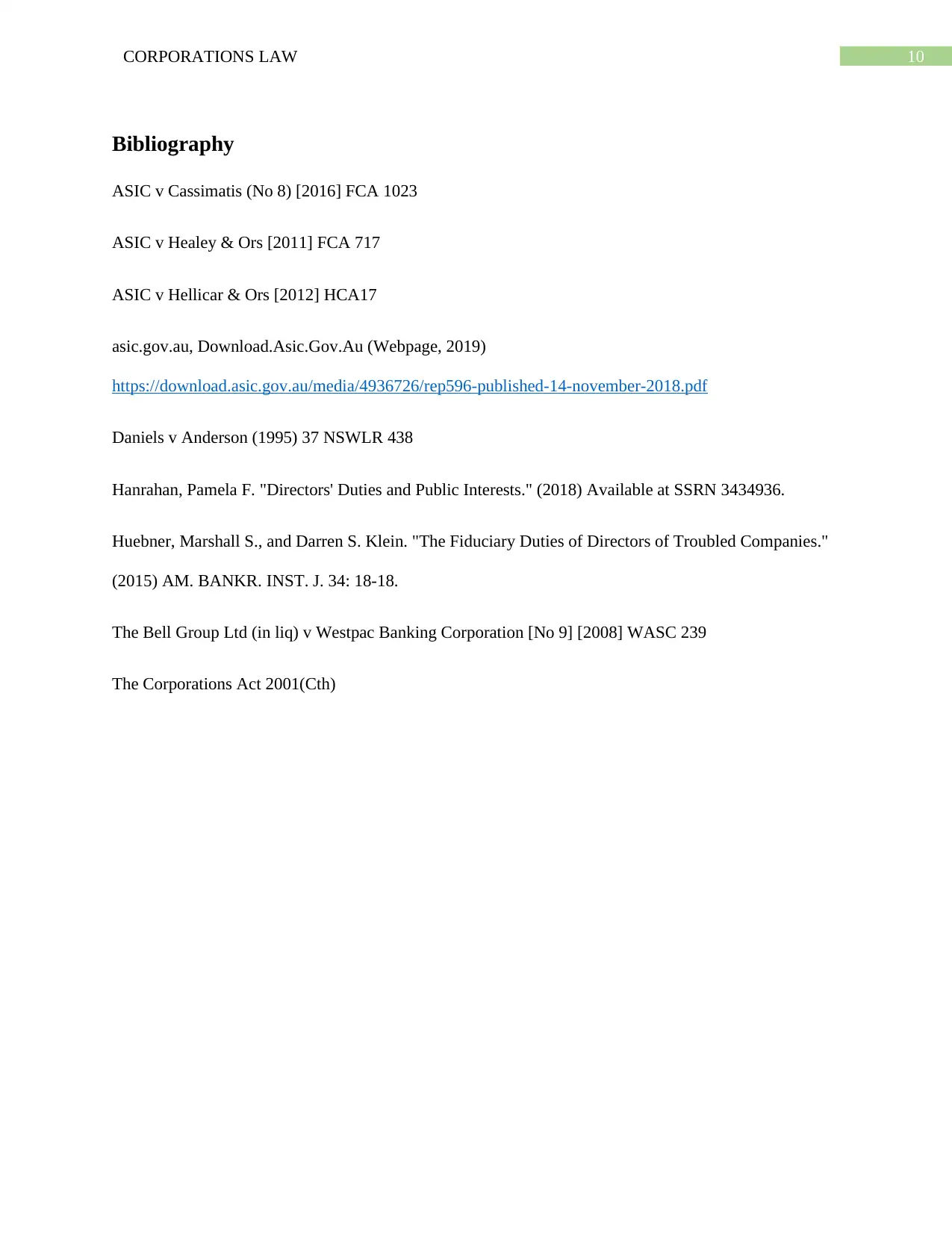
10CORPORATIONS LAW
Bibliography
ASIC v Cassimatis (No 8) [2016] FCA 1023
ASIC v Healey & Ors [2011] FCA 717
ASIC v Hellicar & Ors [2012] HCA17
asic.gov.au, Download.Asic.Gov.Au (Webpage, 2019)
https://download.asic.gov.au/media/4936726/rep596-published-14-november-2018.pdf
Daniels v Anderson (1995) 37 NSWLR 438
Hanrahan, Pamela F. "Directors' Duties and Public Interests." (2018) Available at SSRN 3434936.
Huebner, Marshall S., and Darren S. Klein. "The Fiduciary Duties of Directors of Troubled Companies."
(2015) AM. BANKR. INST. J. 34: 18-18.
The Bell Group Ltd (in liq) v Westpac Banking Corporation [No 9] [2008] WASC 239
The Corporations Act 2001(Cth)
Bibliography
ASIC v Cassimatis (No 8) [2016] FCA 1023
ASIC v Healey & Ors [2011] FCA 717
ASIC v Hellicar & Ors [2012] HCA17
asic.gov.au, Download.Asic.Gov.Au (Webpage, 2019)
https://download.asic.gov.au/media/4936726/rep596-published-14-november-2018.pdf
Daniels v Anderson (1995) 37 NSWLR 438
Hanrahan, Pamela F. "Directors' Duties and Public Interests." (2018) Available at SSRN 3434936.
Huebner, Marshall S., and Darren S. Klein. "The Fiduciary Duties of Directors of Troubled Companies."
(2015) AM. BANKR. INST. J. 34: 18-18.
The Bell Group Ltd (in liq) v Westpac Banking Corporation [No 9] [2008] WASC 239
The Corporations Act 2001(Cth)
1 out of 11
Related Documents
Your All-in-One AI-Powered Toolkit for Academic Success.
+13062052269
info@desklib.com
Available 24*7 on WhatsApp / Email
![[object Object]](/_next/static/media/star-bottom.7253800d.svg)
Unlock your academic potential
© 2024 | Zucol Services PVT LTD | All rights reserved.





